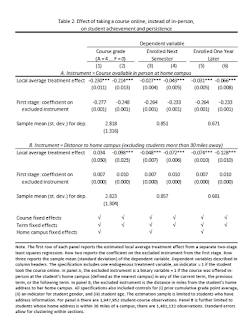Updated Research Proposal
Kerollos Dawoud
Professor Goeller
Research in Disciplines: College!
February 26, 2021
Research Proposal
Working title
Consequences of online learning on the human Psyche and academic performance
Topic Description
As technology has rapidly changed, it is now possible for students to be taught fully online. This new ability could have drastic differences in both the quality of education as well as unintended side effects on students. I will talk about the effects online education has on students, both academically and socially. As more and more students are educated partly and fully online, learning the consequences of online learning would be valuable to students and universities alike.
Research Question
As technology has rapidly changed, it is now possible for students to be taught fully online. This new ability could have drastic differences in both the quality of education as well as unintended side effects on students. How might online college affect the academic and social life of students from those who had a more traditional in-person college education?
Theoretical Frame(s)
In Face-to-face or face-to-screen? Undergraduates’ opinions and test performance in classroom vs. online learning by Nenagh Kemp and Rachel Grieve performed two studies on e-learning by tracking the student’s academic grades and compared them to those who were currently taking the same class in person. Both studies also asked the students their thoughts on online learning, what they preferred, as well as what was better from a more traditional learning experience. Another reason the study was done is to show the “active ingredients” present that makes up the student’s experience and how can the positive aspects of in-person education be implemented for e-learning. The major issue online learning had was the fewer engagement students had with one another. Students often found it difficult to stay engaged in online discussions and had no desire to read other students’ comments while being happy to do so had they been in person instead. Another concern students had while online learning was the lack of immediate feedback from both students and professors. It often took several hours for students to get a response to a question, so many participants disliked e-learning for that aspect. Several positive aspects of online learning are the convenience of doing work whenever the students are the most covenant for them. Students also felt that discussions were much more diverse in nature as it is not only those who are loud and boisterous determining the flow of the discussion as well as what is discussed. Students also liked how detailed the responses were when in a discussion or in peer review when they were online. They also preferred how they are able to take more time for discussions to gather their thoughts better, as well as typing out the response instead of saying it out loud. The study also concludes there wasn’t a statistically significant difference between the grades of online students from their in-person counterparts.
Case(s) or Examples
Another study, How Online College Classes Alter Student and Professor Performance, by Eric Bettinger, Lindsay Fox, Susanna Loeb, and Eric Taylor. The purpose of this study was to have a better understanding of the academic differences between online and traditional learning has on students as well as possible mechanisms that could change students’ performance. The study found out that students who took online classes reduced there odds of getting an “A” by 6%, were 4% more likely to fail a class, as well as an 2.5% increased probability of early withdrawal compared to their in-person peers. The study also listed several key differences between online classes and traditional learning and how the differences could affect the student’s ability to learn as well as other aspects of traditional college life.
One other study, The Effect of Online Learning on Tertiary Level Students'
Mental Health during the Covid19 Lockdown by Ezgin Akpınar focused on the mental effects that online learning had on UK students. The study produced the finding that “ almost 30% of
the students in their study experienced anxiety... caused by the pandemic on their studies as well as their (future) prospects.”(Akpınar 3302-3303). This massive amount of students experiencing anxiety is a troubling sign that online learning may be much more mentally taxing than initially thought.
Working Bibliography in MLA 8 format
Akpınara, Ezgin. “The Effect of Online Learning on Tertiary Level Students' Mental Health during the Covid19 Lockdown.” FutureAcademy.org.uk, The European Journal of Social and Behavioural Sciences, 2020, www.futureacademy.org.uk/files/data/fileManager/ejsbs288.pdf.
Bettinger, Eric et al. "How Online College Classes Alter Student And Professor Performance". Cesinfo, vol 1, no. 1, 2014, pp. 1-38., Accessed 9 Feb 2021.
Dhawan, Shivangi. "Online Learning: A Panacea In The Time Of COVID-19 Crisis - Shivangi Dhawan, 2020". SAGE Journals, 2020, https://journals.sagepub.com/doi/full/10.1177/0047239520934018.
Gya, Ragnhild, et al. “Student Perceptions of Online and in-Person Microbiology Laboratory Experiences in Undergraduate Medical Education.” Medical Education Online, 12 Jan. 2020, www.tandfonline.com/doi/citedby/10.1080/10872981.2019.1710324?scroll=top&needAccess=true.
Jayasinghe, Udeni, et al. “Students’ Performance Evaluation in Online Education System Vs Traditional Education System.” Proceedings of 2015 12th International Conference on Remote Engineering and Virtual Instrumentation (REV), IEEE, 2015, pp. 131–35, doi:10.1109/REV.2015.7087277.
Kemp, Nenagh, and Rachel Grieve. "Face-To-Face Or Face-To-Screen? Undergraduates' Opinions And Test Performance In Classroom Vs. Online Learning". Frontiers, 2014, https://www.frontiersin.org/articles/10.3389/fpsyg.2014.01278/full. Accessed 9 Feb 2021.


Comments
Post a Comment